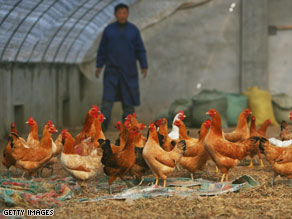TOP STORIES Key discovery made in fight against bird flu
Key discovery made in fight against bird flu
CNN - www.cnn.com
05 Feb 2009
C Hellerman
Photo credit: Getty Images
Area: China
Two teams of scientists say they have found a key area of the H5N1 bird flu virus which seems to be vital to its ability to copy itself, and hope the discovery could lead to new drugs to fight the infection. The discovery is generating excitement among scientists who are looking for a new weapon against the bird flu virus that typically kills more than half its human victims. Two separate groups of scientists -- one in China, one in France -- used a highly technical process to identify protein that seems to be involved in its ability to replicate itself. That gives researchers a new target, as they try and develop new medications.
Related News
>>>3 HK birds positive for deadly bird flu strain
>>>H5N2 virus behind avian influenza outbreak at B.C. turkey farm: CFIA
>>>Avian influenza spreads in Ca Mau [Vietnam]
>>>Egypt confirms 54th human case of bird flu
 Red squirrels on red alert
Red squirrels on red alertChampion News - www.champnews.com
05 Feb 2009
N Young
Photo credit: www.redsquirrelpress.com
Area: Forby and Ainsdale, Merseyside County, England
New figures released by the Lancashire Wildlife Trust, leaders of red squirrel conservation in the area, revealed the population in Formby and Ainsdale pinewoods had shrunk 40% of its normal size by spring 2008 and to 20% by early autumn. The figures were discovered after volunteers surveyed the woodlands six times a year since 2002, enabling accurate monitoring of changes in red squirrel numbers. As the squirrels have continuied to die since autumn 2008, the Trust believes it is likely that one in 10 of those present in 2006 have survived and that only a hundred or so are left in the pinewoods. Large numbers have also died in urban areas of the village, however the disease has not yet spread to Hightown or Blundellsands and Crosby.
 Global Warming Threatens Antarctic Sea Life
Global Warming Threatens Antarctic Sea LifeScienceDaily - www.sciencedaily.com (Source: Florida Institute of Technology)
04 Feb 2009
Photo Credit: Rich Aronson
Climate change is about to cause a major upheaval in the shallow marine waters of Antarctica. Predatory crabs are poised to return to warming Antarctic waters and disrupt the primeval marine communities. "Nowhere else than in these ecosystems do giant sea spiders and marine pillbugs share the ocean bottom with fish that have antifreeze proteins in their blood," says Rich Aronson, professor of biological sciences at Florida Institute of Technology in Melbourne, Fla. "The shell-cracking crabs, fish, sharks and rays that dominate bottom communities in temperate and tropical zones have been shut out of Antarctica for millions of years because it is simply too cold for them."
Cited Journal Article
>>>Climate Change and Trophic Response of the Antarctic Bottom Fauna. PLoS ONE. 2009 Feb 5; 4(2): Epub ahead of print.
Researchers examine role of climate change in disease spread
EurekAlert - www.eurekalert.org (Source: University of Texas Medical Branch at Galveston)
05 Feb 2009
Ever since scientists first proposed that our planet might be experiencing widespread climate change, concerns have been raised about its implications for the spread of arboviruses – viruses carried by arthropods such as mosquitoes, midges and ticks. However, while alterations in temperature and rainfall are important factors in making new territory hospitable to an invading arbovirus, many other forces also play significant parts in new patterns of viral emergence. That's the message of a paper in the February "Transactions of the Royal Society of Tropical Medicine and Hygiene" by University of Texas Medical Branch at Galveston pathology professor Stephen Higgs and Oxford University professor Ernest A. Gould.
>>>Impact of climate change and other factors on emerging arbovirus diseases. Trans R Soc Trop Med Hyg. 2009 Feb; 103(2): 109-21.
OTHER WILDLIFE HEALTH RELATED NEWS
Photo credit: National Geographic News - news.nationalgeographic.com
 SEA LIFE PHOTOS: Five New Pygmy Seahorse Species Found [Indonesia]
SEA LIFE PHOTOS: Five New Pygmy Seahorse Species Found [Indonesia] - Brucellosis battle [Montana]
- Extinct Ibex Resurrected by Cloning… then Goes Extinct Again [Spain]
- PHOTOS: Brilliant New Frog, Salamander Species Found [Columbia]
- Sharks feel bite of overfishing

- None of 9,000 deer checked for chronic wasting disease statewide test positive [Michigan]
- Dramatic rescue of dolphins and whale [Cap Cod, Massachusetts]
- Health checkups today for Sacramento Zoo flamingos [west nile virus]





No comments:
Post a Comment